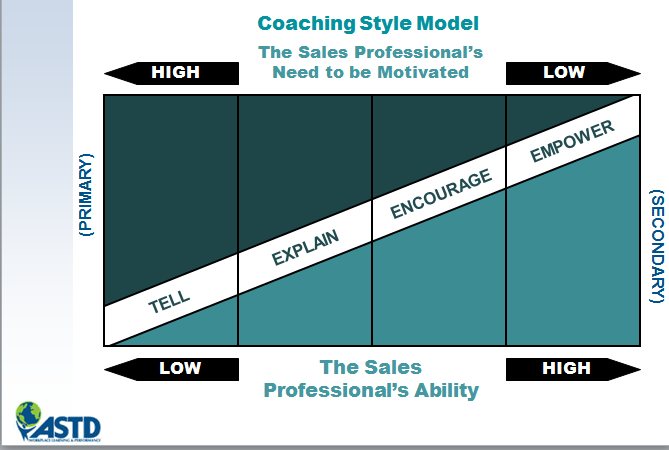ATD Blog
Sales Coaching Styles: Matching Ability with Motivation
Tue Aug 06 2013

Sales Coaching Styles: Matching Ability with Motivation
In previous blog topics mined from ASTD’s Sales Coaching for Business Impact Certificate we explored how a sales coach needs to assess sales rep performance by remembering that one “can’t do a result.” Activities drive results that require the enlightened sales coach to use a balance of both “leading inputs” and “lagging” outputs to assess sales performance.
The blog on “What is Sales Coaching?” examined the relationship between training, mentoring, and coaching and how they can be applied to developing skills, talent, wisdom, knowledge, ability, and experience. The blog also described what behavior is not sales coaching and how to be thoughtful when choosing when to coach or not to coach.
The blog entitled “The Three Legs of the Sales Coaching Stool” discussed the need for a sales manager to establish a firm coaching foundation comprised of observation, feedback, and motivation to get the best and most impactful coaching results.
Combining all these lessons learned together creates the opportunity for sales leaders to use the best coaching style with the right sales rep based on his or her unique sales situation that most benefits from coaching. Consistently using the right sales coaching style facilitates the development of a high performance sales culture. The following model is used to illustrate how to do just that.
The model is separated by two halves. Each half can be thought of as a “lens” for viewing and evaluating sales rep behavior.
Ability: Describes the learned and innate selling competence of the sales person being coached
Need to be Motivated: Describes the level of need to help get the sales rep emotionally engaged.
Note the “Primary” and “Secondary” labels on either end of the Coaching Styles model. When a sales professional’s situation is difficult to evaluate, focus first on that individual’s observed (Primary) emotional engagement in the situation and then their next most observable (Secondary) behavior. This is helpful because it gauges the level of willingness, whether the sales rep is open to being coached. With observation, a clearer picture and a more accurate assessment will emerge over time on how best to coach the individual.
The model describes four coaching styles:
Tell – This coaching style is used for the individual with Low Ability and a High Need to be motivated. Telling means that you, the sales manager or leader, should probably be asking fewer questions during the coaching and providing more direction. Your bottom line approach as a coach is to help people in this situation experience success in the task as quickly as possible, so they don’t lose motivation.
The important thing to remember is that the coach should stay around to observe how well the individual follows directions and then the sales manager can provide motivation and feedback based on what is observed. Simply giving directions to the person being coached and leaving the rep alone is not coaching.
Explain – This coaching style is used for the sales rep with Moderate Ability with a Significant Need to be motivated. Explaining means that the coaching conversation is much more two-way. There should be lots of “give and take” dialogue between the coach and the rep to ensure that success can be sustainable and repeatable.
Encourage – This coaching style is used for the sales professional with Significant Ability and a Moderate Need for motivation. Encouraging means that the rep is quite able to do the job so the need is to increase the sales rep’s confidence and motivation so he or she can more frequently experience success on his or her own.
Empower – This coaching style is used for the individual with High Ability and a Low Need for motivation. An Empowering coaching style means not assuming that the high performing professional doesn’t need much of your involvement just because he or she is already very accomplished. You, the sales manager, should still stay close enough to that high performer to credibly observe, motivate, and provide on-going feedback so that high performer knows you know what they’re up to.
The manager should consider doing things that help the sales rep identify obstacles to achieve even greater sales success. The sales coach can also turn the focus to creating a more fulfilling sales career path for that high performer. Just think if an enlightened sales manager focuses on helping a rep remove obstacles (for example, perceived order entry bureaucracy) that are getting in the way of even greater sales excellence how much more motivated that individual might be to perform even better! So by using the right coaching style and approach with the right sales professional, a sales leader “wearing the hat of sales coach” can further broaden his or her ability to motivate and engage a sales team to achieve even greater levels of sustainable results and sales excellence.
Learn more in ASTD Education's Sales Coaching for Business Impact Certificate program.
View upcoming dates and locations.
